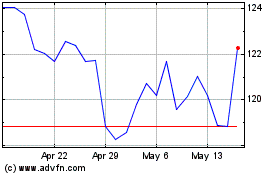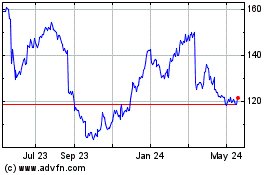By Natasha Khan and Yifan Wang
HONG KONG -- Big American retailers are getting tough with
Chinese suppliers as import tariffs bite, cutting orders,
negotiating down prices and demanding faster turnarounds.
Walmart Inc. and Home Depot Inc. have pulled some planned
purchases forward to get ahead of any potential increases or
expansion of tariffs, according to a Walmart spokesperson and the
transcript of an earnings call from Home Depot. Amazon.com Inc. cut
back purchases and orders for certain of its private-label products
where the tariffs make it no longer profitable to offer those goods
to customers at sub-competitor prices, according to a person
familiar with the matter. The person declined to comment on
specific product lines, but added that Amazon sources a bulk of its
consumer electronics from China.
Dollar Tree Inc. said in an emailed statement it has negotiated
price concessions from vendors, canceled orders and changed its
product mix. Target Corp. said in an emailed statement it has "many
levers" it can pull to remain price competitive, without
elaborating.
In China, manufacturers of handbags, lighting, footwear and
other products say they are feeling the strain. Many are trying to
find new customers outside the U.S. and some have resorted to
offering discounts in a bid to halt a slide in orders.
The U.S. imported $1.4 billion worth of handbags and $14.7
billion worth of footwear from China in 2017, while imports of
lighting equipments reached $711 million, according to figures from
the United Nations Comtrade Database.
Both sides are hoping that trade talks between Presidents Donald
Trump and Xi Jinping at the G-20 summit this week in Buenos Aires
will reduce trade tensions and stave off a more damaging round of
duties.
The latest levies at 10% on $200 billion in Chinese goods took
effect on Sept. 24 and are slated to rise to 25% at the beginning
of next year. Mr. Trump has threatened to expand the list to more
than $250 billion worth of new products, covering almost all other
goods imported from China.
In an interview with The Wall Street Journal, this week
President Trump said he expects to move ahead with boosting tariff
levels on $200 billion of Chinese goods to 25%, calling it "highly
unlikely" that he would accept Beijing's request to hold off on the
increase.
Walmart, the world's biggest retailer, said in an emailed answer
to questions before that interview that it hopes the meeting will
"produce a constructive framework to resolve the trade
tensions."
U.S. companies have stressed to investors efforts they are
making to mitigate the impact of tariffs on their margins,
including by passing cost increases along to customers where they
can't win concessions from suppliers. Retailers in particular say
that, while the tariffs so far haven't had a huge impact on their
operations, that could change if they get steeper or are applied to
more products.
While last month's export data from China showed an increase,
manufacturers have said that is partly due to buyers "frontloading"
orders to move batches to the U.S. before January's expected tariff
increase.
Dozens of these Chinese manufacturers interviewed by The Wall
Street Journal report dampened sales. Sunshine Leisure Products, a
maker of camping chairs in the eastern province of Zhejiang, said
orders are down about 30% even as it lowered prices by up to 7%. A
supplier of LED decoration lights in the eastern province of
Shandong said orders for next year -- typically settled by November
-- were still in abeyance, as American customers ask it to bear the
10% tariff. In the southern city of Shenzhen, a sales manager for
Homegard International, which produces tables, chairs and sofas,
said orders have fallen by half.
Extended haggling over orders is throwing supply-chain
negotiations into disarray. Typically, in the final quarter of the
year merchants begin discussions about new products, models and
orders for the next year. But many say that hasn't happened.
Order negotiations have dragged on, says Andy Li, sales manager
for a company in the southern province of Fujian that supplies
backpacks and other assorted textile gifts for companies such as
Walmart. Usually order negotiations take about two weeks, but it
has been at least a month with no resolution with some customers,
Mr. Li said, declining to identify them.
Taizhou Shilin Shoes, based in the eastern province of Zhejiang,
says its two American customers have told it they need to order
from factories that manufacture lower-priced shoes made with
inferior materials to reconcile prices.
At a recent trade fair in Guangzhou, exhibitors reported fewer
American buyers. That is spurring Chinese suppliers to look for
other sources of revenue, they said, such as more aggressively
targeting European buyers.
The impact has extended to products not yet on the tariff list,
such as toys, for fears that they will be hit if trade relations
worsen. One toy maker says buyers are seeking to get orders ready
for shipping in much shorter time than the customary
six-to-eight-week turnaround period.
If levies do expand to toys -- and 82% of toys sold in the U.S.
are imported from China, according to the U.S. Department of
Commerce -- buyers may have to pay more for them, said John Tong,
honorary president of Hong Kong Toys Council. "In the short term,
there's no other country that can achieve a comparable capacity,"
he said.
Hasbro said in a statement that prolonged trade tensions will be
"damaging to our industry and our company."
Home Depot anticipates price rises if additional 25% tariffs go
in place as planned, adding in a conference call with analysts that
it saw increases in washing-machine prices when tariffs hit earlier
in the year.
Walmart's merchants are combing through a list of each item
affected by tariffs, working with suppliers to bring costs down,
Walmart Chief Financial Officer Brett Biggs said in an
interview.
"If we get tariffs as discussed in January prices are going to
go up," according to Mr. Biggs.
Sarah Nassauer in New York and Yasufumi Saito in Hong Kong
contributed to this article.
Write to Natasha Khan at natasha.khan@wsj.com
(END) Dow Jones Newswires
November 28, 2018 07:18 ET (12:18 GMT)
Copyright (c) 2018 Dow Jones & Company, Inc.
Dollar Tree (NASDAQ:DLTR)
Historical Stock Chart
From Jan 2025 to Feb 2025

Dollar Tree (NASDAQ:DLTR)
Historical Stock Chart
From Feb 2024 to Feb 2025
